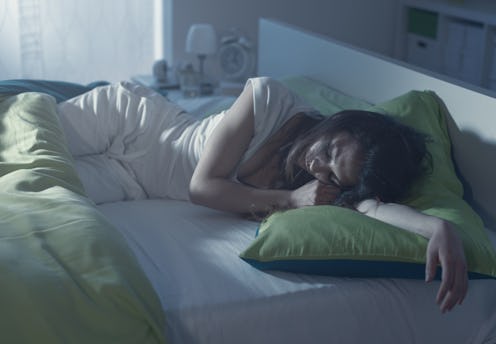
There are two kinds of people in the world: those who live to nap, and those who literally can't understand nappers. According to a new study from Rutgers University published in the journal Current Biology, a variety of factors determine whether or not you love naps. In a study of fruit flies, researchers identified a "daywake" gene that both activates and suppresses the desire to nap. Overall, most species nap more on warm days, which scientists speculate could serve as protection against overexposure to high temperatures.
On cooler days, the daywake gene suppresses the urge to nap and instead promotes productivity. "This gene contributes to behavioral flexibility, or the ability to hide from the noontime sun when weather is hot but engage in activities good for survival when the weather is cool," co-author Isaac Edery, a professor at the Rutgers center, said in a press release. "Although the daywake gene is not present in humans, our finding reinforces the idea that nighttime sleep and daytime siesta are governed by distinct mechanisms and serve separate functions for health and survival."
While humans may not have the daywake gene, a study published in the journal Proceedings of the National Academy of Sciences, found that a gene mutation could be responsible for why some people need more sleep than others and opt for midday naps.
Mice that were found to have the mutation got less REM sleep at night, which could account for the increased desire to nap during the day. If you're a napper, naps have a lot of benefits, and many cultures indulge in midday naps on the regular.
"More than 85% of mammalian species are polyphasic sleepers, meaning that they sleep for short periods throughout the day. Humans are part of the minority of monophasic sleepers, meaning that our days are divided into two distinct periods, one for sleep and one for wakefulness," the National Sleep Foundation reported. "It is not clear that this is the natural sleep pattern of humans. Young children and elderly persons nap, for example, and napping is a very important aspect of many cultures."
Perhaps humans stop napping as they get older because there isn't always time. Once you're in school and then in the workforce, getting sh*t done is often prioritized over napping. However, you don't need to invest a lot of time in napping to reap the rewards. Generally, it's recommended that naps be no longer than 30 minutes because short naps can help rejuvenate you without interfering with your nighttime sleep.
What's more, taking a short nap is good for your mental health. "Napping has psychological benefits. A nap can be a pleasant luxury, a mini-vacation. It can provide an easy way to get some relaxation and rejuvenation," the National Sleep Foundation wrote.
That being said, not everyone likes to nap. While taking a quick siesta can be rejuvenating for some, it can have the opposite effect on others. "Regardless of how long I nap, at what time of the day I nap, the reason I nap, the weather conditions during the nap, or my caffeine intake in the hours surrounding the nap, I never fail to feel like absolute garbage when I wake up," Danielle Joyce wrote for Thought Catalog.
If you're not a napper, there's nothing wrong with you. Everyone is different, so you do you. Personally, I love nothing more than a short midday nap. Most days I put on my sleep mask, lie down, and do the 30-minute Power Nap meditation by Andrew Johnson on Insight Timer. It helps me relax and destress, and then continue on with my day feeling refreshed.
While short naps are beneficial, if you feel the need to nap for several hours a day, a study published in the American Journal of Epidemiology suggested it could be a sign of an underlying health condition. If this sounds like you, it might be time to see a doctor. If not, nap away.